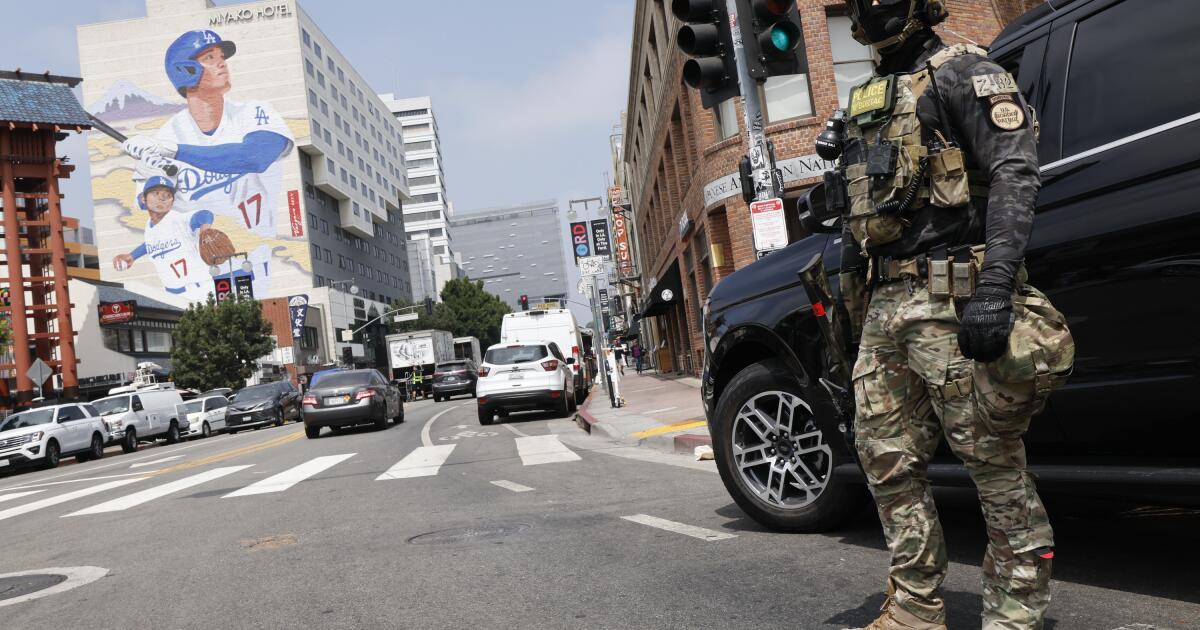L.A. County moves to carve out ‘ICE-free’ zones following immigration raid violence
After escalating incidents of violence involving federal agents taking part in the Trump administration’s immigration crackdown, officials are looking to create “ICE-free” zones in L.A. County.
The Los Angeles County Board of Supervisors voted unanimously on Tuesday to bar immigration enforcement officers from county-owned spaces.
Lindsay Horvath, the District 3 supervisor, announced the motion to establish county property as “U.S. Immigration and Customs Enforcement-free” zones, prohibiting agents from staging, processing or operating in those areas.
“Los Angeles County will not allow its property to be used as a staging ground for violence caused by the Trump administration,” Horvath said at the Tuesday Board of Supervisors meeting.
The motion instructs county counsel to draft an ordinance for board consideration within 30 days.
The Times reached out to the Department of Homeland Security for comment but did not receive a response by publication.
Since June 6, 2025, when immigration enforcement officials descended on the region — raiding four businesses including a fast-fashion warehouse in downtown Los Angeles and detaining dozens — to the first month of 2026, Horvath said, “federal immigration enforcement has too often escalated into extreme violence.”
“Our federal government is freely, without cause, murdering its own citizens in broad daylight,” she said, “in front of witnesses and cameras.”
The action comes after multiple incidents of violence in California as well as last week’s fatal shooting in Minnesota of 37-year-old Renee Good by a federal immigration agent, which spurred outcry across the country. Good, a mother of three, has been portrayed by government officials as a domestic terrorist who tried to run down an agent with her vehicle. State and local officials in Minneapolis have rejected those claims.
On Friday in Southern California, a 21-year-old protester underwent six hours of surgery after a Department of Homeland Security agent fired a nonlethal round at close range at him during a protest. The protester is shown in video, his face covered in blood, being dragged by the neck by an agent. He suffered a fractured skull around his eyes and nose and permanently lost the vision in his left eye, according to family.
An off-duty ICE agent fatally shot Keith Porter Jr. at a Northridge apartment complex on New Year’s Eve. The officer suspected that Porter was an “active shooter,” according to the DHS. Porter was firing an assault-style rifle in what family members said was an act of celebration on New Year’s Eve.
“I think it’s really important for our communities to understand what we’re saying is, you don’t have the right to come in and harass people without a federal warrant,” said Hilda Solis, District 1 supervisor and co-author with Horvath of the motion. “If [federal agents] use our property to stage, then you need to show us documentation, a federal warrant, to back that up.”
Solis said she hoped city councils and other jurisdictions would be motivated to adopt their own ordinance to create “ICE-free” zones.
Prior to President Trump taking office in 2025, ICE agents were prohibited from conducting arrests and other enforcement activity in sensitive locations, including places of worship, schools and hospitals.
A DHS directive from Jan. 20, 2025, superseded that practice, saying that officers taking enforcement action in a sensitive location should use “discretion along with a healthy dose of common sense.”
Bay Area officials are also considering the adoption of “ICE-free” zones. Alameda County officials introduced a proposal for these designated zones in November; on Thursday, officials will incorporate feedback from the county’s sheriff, district attorney, probation department, and public defender, The Oaklandside reported.
The first “ICE-free” zone ordinance was established by Chicago in October barring immigration enforcement agents from property owned or controlled by the city.


